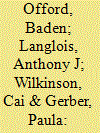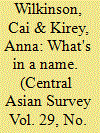|
|
|
Sort Order |
|
|
|
Items / Page
|
|
|
|
|
|
|
| Srl | Item |
| 1 |
ID:
153308


|
|
|
|
|
| Summary/Abstract |
In titling their book Queer Wars, Dennis Altman and Jonathan Symons (2016 Altman, Dennis, and Jonathan Symons. 2016. Queer Wars. Cambridge: Polity Press.
[Google Scholar]
) rightly call attention to the fact that for many lesbian, gay, bisexual, transgender and queer (LGBTQ) people around the world, the current international contestation over the protection of LGBTQ people’s human rights is a matter of life and death.
|
|
|
|
|
|
|
|
|
|
|
|
|
|
|
|
| 2 |
ID:
153723


|
|
|
|
|
| Summary/Abstract |
The Association of South East Asian Nations (ASEAN) escalated its community building project significantly over the last decade, culminating in the launch of a reformed and substantially integrated ASEAN Community at the end of 2015. This article considers what might follow from this newly reformed and rhetorically people-focused version of ASEAN for matters of sexual orientation and gender identity and expression (SOGIE). In claiming to be people-oriented and people-centred, and by developing a regional rights regime, ASEAN opens itself to standards by which it can be measured and held to account. We critically review ASEAN 2025: Forging Ahead Together, and consider civil society's response, focusing on the critique offered by the ASEAN SOGIE Caucus, the peak civil society organisation for ASEAN SOGIE matters. We focus on three themes: identity, visibility politics, and rights. We argue that while ASEAN falls short of its own rhetorical standards, these same standards support a politics which keeps rights in contestation, enabling civil society to push for accountability to international standards, and a more democratic politics.
|
|
|
|
|
|
|
|
|
|
|
|
|
|
|
|
| 3 |
ID:
114948


|
|
|
|
|
| Publication |
2012.
|
| Summary/Abstract |
This essay examines the development of one regional blogosphere, the Central Asian 'Stanosphere', through a focus on the neweurasia blog project. The neweurasia project began in 2005 as an English-language volunteer-run blog project about the former Soviet republics of Central Asia and the Caucasus, rapidly becoming one of the most visited blogs about the region. Following this auspicious start, over the next five years neweurasia developed into a multi-language locally driven project with more than 80,000 unique page views on average per month. Despite its indisputable successes, the project was often a steep learning curve for all involved. In this essay, we examine neweurasia's evolution from 'blogging Central Asia' towards a citizen media project, and reflect on some of the issues and challenges encountered. On the basis of our discussion, we reflect upon how neweurasia, and citizen media in general, can maximise its impact on the nascent Stanosphere, in the process helping to give Central Asia a voice in the global blogosphere.
|
|
|
|
|
|
|
|
|
|
|
|
|
|
|
|
| 4 |
ID:
101299


|
|
|
|
|
| Publication |
2010.
|
| Summary/Abstract |
In this article, we focus on the ways in which non-heterosexual and transgender youth involved with the non-governmental organization 'Labrys' in Kyrgyzstan have begun to demand the protection of their basic civil and human rights on the basis of self-identification as 'LGBT'. This acronym, which stands for Lesbian, Gay, Bisexual and Transgender, is relatively new to Kyrgyzstan and other post-Soviet states, and represents a change in the terms used by non-heterosexual and transgender people to describe themselves. We frame our discussion using the concepts of sexual citizenship, private/public divides and stigma and base our discussion on debates amongst the staff and community of Labrys about the purpose and scope of the organization. Centrally, we suggest that the strategic use of 'LGBT' as a public and politicized identity represents a new, pro-active form of stigma management. By employing this strategy, young LGBT people become 'would-be' sexual citizens and challenge traditional societal norms that seek to keep discussion of sex and sexuality in the private sphere and restrict rights to heterosexual, cisgender citizens.
|
|
|
|
|
|
|
|
|
|
|
|
|
|
|
|
|
|
|
|
|